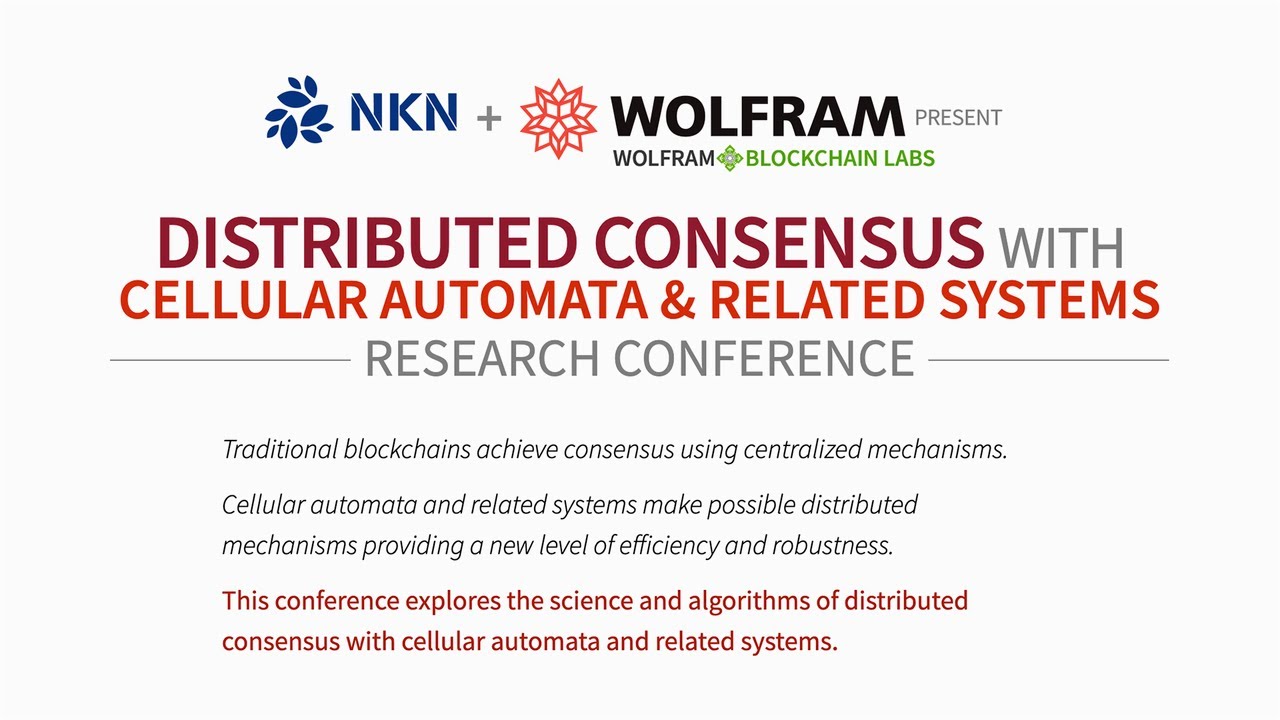Distributed consensus Conference By NKN and Wolfram Research
Live Highlights
On May 26, 2021, 11AM US East time, NKN and Wolfram Research successfully held a research conference on distributed consensus and cellular automata. This event has attracted more than 600 real-time audiences on YouTube, Zoom and Twitch with an amazing speaker lineup including Dr. Stephen Wolfram (Author of "A New Kind of Science’’, Chief Designer of Mathematica and Wolfram Language and Wolfram Alpha), Dr. Yilun Zhang (CTO of NKN) and other guests from internationally renowned universities and crypto projects such as Boston University, IOTA, AVA Labs, etc.
“Consensus” is increasingly becoming a hot topic for mainstream media, social networks and the general public: people have begun to realize that it is indeed an essential of the coming era.
But what are the basics, principles and practicalities of consensus? What have we gone through before turning the traditional blockchain consensus into a distributed mechanism? And how much optimization could it actually bring to a real world application?
An academic feast awaits you, that both beginners who never dabbled and those who are well versed in the consensus field will in no doubt enjoy. If you missed the live event or want to rewatch, we’ve got you covered!
Dr. Stephen Wolfram
Founder & CEO of Wolfram Research, author of “A New Kind of Science”, chief designer of Mathematica, Wolfram language and Wolfram Alpha
When it comes to distributed consensus, what is the exact problem that we are trying to solve? Why are we still looking for a way to achieve distributed consensus when the traditional blockchain are already able to reach consensus? How does cellular automata theory enable distributed consensus, and what principle allows it to significantly shorten the consensus process, reduce time and save energy consumption?
While studying complex systems of nature and working on mathematical formulas, how did Dr. Wolfram discover his interest in cellular automata? How does he see the multiple evolutions of speed, dimension, and breadth that the blockchain can achieve after the realization of distributed consensus, so as to contribute to the future Internet and other human needs that rely on distributed systems?
Dr. Yilun Zhang
Chief Technology Officer of NKN, PhD University of California, San Diego
As the largest blockchain network with over 100,000 full nodes, how did NKN manage to build such a large scale blockchain network based on the Cellular automata algorithm? Typically, in order to guarantee consensus and prevent attacks from malicious nodes, traditional blockchain systems usually sacrifice scalability.
However, NKN blockchain network, as one of the three main fundamental infrastructure for Web 3.0, specializes in transmission. It requires an extremely high scalability to guarantee network security, speed and distribution.
How did NKN invent MOCA consensus algorithm based on cellular automata theory in its creation of the NKN blockchain network? And how did the applications developed by NKN benefit from MOCA’s high efficiency, finality, robustness, short convergence time and huge scalability?
Live Q&A
In the very first Q&A panel, we are flooded with many interesting questions from our Live audiences.
For example, we had questions like “Could cellular automata be employed to attack the problem of finding a (potentially superior topology paradigm? What would that endeavor look like and what resources would be required?”, “Can you comment on the electricity requirements of the NKN consensus mechanism versus the other blockchain such as bitcoin and ethereum?”, and “Is it possible for cellular automata to achieve reliable consensus under nondeterministic noises and benecious attacks?”…etc.
Dr. Wolfram and Dr. Yilun gave systematic answers during the live session and other guests also participated in the discussion.
The Q&A session was no less compelling than a world class professional training course that you could imagine in an IVY league university!
Guest speaker panel
Our symposium also includes guest speakers from internationally renowned universities like Boston University, Stavanger University, Mackenzie University and elite crypto projects IOTA, AVA Labs and Topl. These experienced professors and project leaders shared their knowledge and research related to consensus and cellular automata, analyzed the technology implementation based on real life scenarios and examples, and carried out deep discussions with the live audiences.
Don’t miss this opportunity to come in and wander in the fascinating world of “distributed consensus” and “cellular automata”. Be the first one among your friends to understand the basics of “distributed consensus” and the “cellular automata system”!

